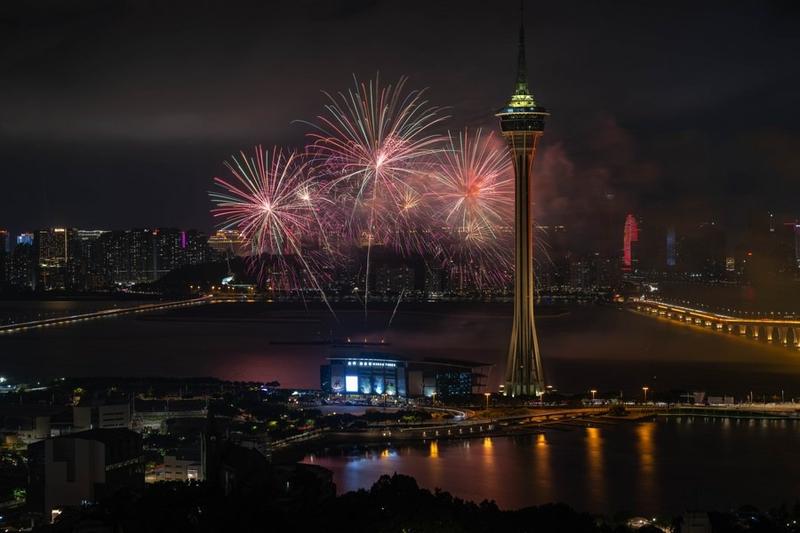 The fireworks display in Macao, south China on Oct 1, 2023. (PHOTO / XINHUA)
The fireworks display in Macao, south China on Oct 1, 2023. (PHOTO / XINHUA)
MACAO - The Mainland and Macao Closer Economic Partnership Arrangement (CEPA) has brought about unprecedented opportunities to the Macao Special Administrative Region (SAR) and promoted joint development over the past two decades.
CEPA, a free-trade-agreement-like arrangement established between two separate customs territories of a single sovereign state, was officially signed on Oct 17, 2003, and implemented in January 2004, to further enhance the level of economic and trade cooperation between the two places.
ALSO READ: Macao SAR delegation to attend 3rd Belt and Road forum
Between 2004 and 2013, the two sides signed 10 supplements to CEPA, as well as the CEPA Agreement between the Mainland and Macao on Achieving Basic Liberalization of Trade in Services in Guangdong, CEPA Agreement on Trade in Services, CEPA Investment Agreement, and so on.
Lao Keng Chong, director-general of the Macao Innovation Development Research Association, said the implementation of CEPA has further deepened and materialized cooperation mechanism between the mainland and Macao, which serves as a specific example of the advantages of "one country, two systems" in the economic sector.
Ip (Ip Kuai Peng, Vice-Rector of the City University of Macao) said that Macao should continue making good use of preferential policies from the central authorities, speed up building Macao into a world tourism and leisure center, a service platform for business and trade cooperation between China and Portuguese-speaking countries, and a base for exchanges and cooperation with Chinese culture as the mainstream where multiple cultures co-exist
"The central government's integrated institutional arrangement has provided a fundamental guarantee for Macao's long-term prosperity and stability," Lao said.
Over the years, CEPA has continuously expanded and deepened opening-up in trade in goods, trade in services, investment, and economic and technological cooperation, increasing the flow of goods, personnel, capital and technology between the mainland and Macao.
Chan Tze Wai, acting director of the Economic and Technological Development Bureau (DSEDT) of the Macao SAR government, said the arrangement has created unprecedented opportunities for various sectors in Macao.
READ MORE: Thousands of tourists visit Macao, HK during Golden Week
In terms of trade in goods, all Macao-made products that comply with CEPA's specific rules of origin can enjoy zero-tariff policies when being exported to the mainland. Statistics from the DSEDT showed that as of September this year, Macao enterprises had exported zero-tariff goods to the mainland worth up to 1.4 billion patacas ($174 million), saving tariffs of over 90 million patacas.
As of date, the bureau has issued 876 certificates of service providers to help Macao companies expand business in the mainland.
Thanks to CEPA's opening-up policy, enterprises and professionals from Macao in the areas of finance, medical, legal, tourism and social services were able to operate in the mainland.
Ip Kuai Peng, Vice-Rector of the City University of Macao, said that Macao had enjoyed conveniences in the opening up of goods and service trade as well as investment, deepened cooperation with the mainland in economic and technological areas, facilitated two-way trade and investment, and forcefully promoted social integration between the mainland and Macao and their quality economic development.
READ MORE: China's 8-day holiday sparks travel boom in Macao SAR
"This also fully demonstrates the central authorities' strong support for Macao's appropriate economic diversification and its integration into overall national development," Ip added.
Under the CEPA framework, Macao was able to further open up its market, attracting many mainland and foreign enterprises to set up their branches in the city.
Yu Wai Hang, secretary-general of the Macao Innovation Development Research Association, said these enterprises not only enriched Macao's industrial structure and brought a large amount of job opportunities, but also helped with the development of Macao's service and tourism industries and hence its appropriate economic diversification.
 Macao Special Administrative Region (SAR) celebrates the 74th anniversary of the founding of the People's Republic of China in south China's Macao, Oct 1, 2023. (PHOTO / XINHUA)
Macao Special Administrative Region (SAR) celebrates the 74th anniversary of the founding of the People's Republic of China in south China's Macao, Oct 1, 2023. (PHOTO / XINHUA)
Vong Kok Seng, vice president of the board of directors of the Macao Chamber of Commerce, said CEPA not only generated economic benefits for the mainland and Macao, but also provided a broader platform for people-to-people exchanges and social cooperation between the two sides.
Chan said the Macao SAR government will join the mainland to actively seek methods to enrich the contents of CEPA, to help Macao better integrate into overall national development and promote long-term economic cooperation between the two sides.
Ip said that Macao should continue making good use of preferential policies from the central authorities, speed up building Macao into a world tourism and leisure center, a service platform for business and trade cooperation between China and Portuguese-speaking countries, and a base for exchanges and cooperation with Chinese culture as the mainstream where multiple cultures co-exist.
"Macao should continue deepening opening-up and cooperation, attracting foreign enterprises to set up their Asia-Pacific headquarters here, serving as a window for China's development pattern of dual circulation of domestic and international markets, and making greater contributions to national development," Yu added.


